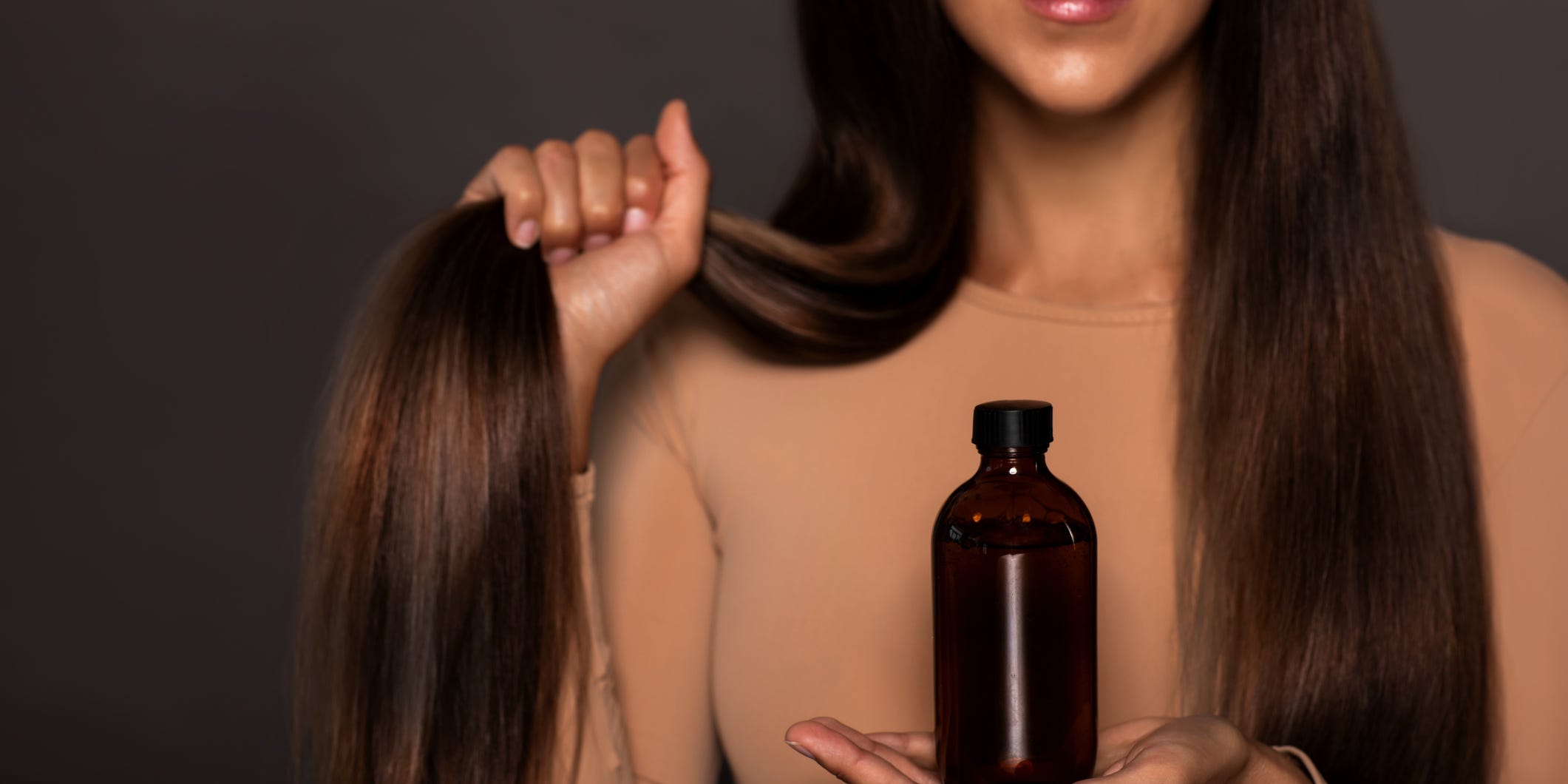
- Olive oil is great for hair because it contains moisturizing ingredients like squalene and oleic acid.
- It may also help prevent split ends because it can increase hair elasticity.
- Apply cold-pressed extra virgin olive oil to the ends of the hair, but be sure to avoid the scalp.
- Visit Insider's Health Reference library for more advice.
Most people recognize olive oil as a common cooking ingredient, but in recent years, this kitchen staple has become popular in hair and skin care. While there is plenty of anecdotal evidence to support olive oil's beauty benefits for hair, the science so far is limited.
The belief that olive oil is good for hair comes from its components, particularly oleic and stearic acids. These fatty acids not only offer health benefits when consumed but may also offer cosmetic benefits to your hair when applied topically.
Here's three potential benefits of olive oil for hair as well as the risks of using it.
1. Moisturizes hair
While scientific evidence is limited, the chemical makeup of olive oil shows potential for a moisturizing effect when applied to the hair or skin.
This is because olive oil contains:
- Oleic acid, which is an emollient with softening and moisturizing properties. Olive oil's high oleic acid content is thought to help moisturize hair by penetrating the hair shaft to restore moisture, says Fabio Scalia, a certified cosmetologist, and owner of Fabio Scalia salons.
- Squalane is another type of emollient popular in skincare products due to its ability to hydrate skin.
2. Helps prevent split ends
The moisturizing properties of olive oil may also help strengthen the hair and increase its elasticity, helping to prevent breakage or split ends.
However, olive oil can not repair split ends once they occur, Scalia says. While olive oil can help soften the hair and keep it healthy, the best way to deal with split ends is to get regular haircuts to remove any breakage.
3. May help stimulate hair growth
Many people claim olive oil makes hair grow faster, but the data on this is limited, says Patrick Zito, DO, PharmD, a voluntary assistant professor of dermatology at the University of Miami Miller School of Medicine.
A 2015 study found that a component in olive oil known as oleuropein does have an impact on the hair growth cycle in mice, but similar studies have yet to be conducted in humans.
Plus, many individual factors, like diet, genetics, and hormones, can impact hair growth, making it hard to study olive oil's direct effects on hair growth in humans, says Karen Lal, DO, Chair for the Society of Pediatric Dermatology.
But olive oil does contain vitamin E, which can help smooth hair and reduce frizz giving the appearance of hair growth, Scalia says. Vitamin E's antioxidant effects may also support a healthy scalp, which could promote hair growth, but more research is needed.
Potential risks of using olive oil for hair
Olive oil can help lubricate and moisturize hair to reduce dryness and protect against split ends, Lal says, but it can also be a risky choice depending on your hair type.
Scalia recommends olive oil for people with curly, thick and coarse hair that is more prone to frizz and dryness. Olive oil applied to fine or straight hair, on the other hand, could potentially weigh it down and make it feel greasy.
You also should not use olive oil in your hair if you have dandruff, Zito says. That's because olive oil promotes the growth of the yeast that causes dandruff.
"In individuals prone to dandruff, [olive oil] can actually worsen the condition like throwing kerosine onto a fire," Zito says. "The more often you apply it, the greater the chance of exacerbating the condition."
Some people also claim olive oil can act as a heat protectant, but Zito does not recommend this. Extra virgin olive oil has a smoking point of 320 °F, Zito says, and many flatirons, wands, and curling irons reach temperatures much higher than that between 400 and 500 degrees Fahrenheit.
"What this means is that at this temperature [320 °F], the oil begins to smoke, produce fumes, and create free radicals," which can damage hair Zito says.
How to use olive oil for hair
If you want to try out olive oil for your hair, Lal recommends applying cold-pressed extra virgin olive oil to the ends of the hair, not the scalp.
The exact amount of olive oil your hair requires will vary from person to person, Scalia says, but it doesn't take much. You should use just enough to work it through the middle of your hair down to the ends.
Olive oil is very hard to wash out, so Scalia recommends using it prior to shampooing your hair as a moisturizing treatment. You can leave it in for about 15 minutes and then wash it out with a clarifying shampoo and a replenishing conditioner. Lal recommends doing this once or twice a week.
Insider's takeaway
There is not much scientific evidence to support the hair benefits of olive oil. But olive oil does contain fatty acids and vitamins with moisturizing properties that may help protect your hair against split ends and make it appear smoother and healthier.
If you want to try olive oil on your hair, work a small amount through your hair from the middle to the ends and then wash it out with shampoo. Using olive oil as a moisturizing treatment is mostly recommended for people with dry, coarse, or frizzy hair and should not be used if you have dandruff.
